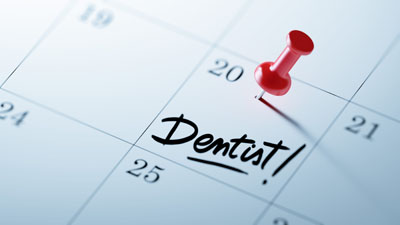 v>People may wonder from time to time, "How do I know if I have a cavity?" Tooth decay or cavities are one of the most common oral health problems that a person will face throughout their lifetime. They happen so frequently in children that the Centers for Disease Control and Prevention, CDC, lists cavities as an infectious disease. It is important to know the signs of a cavity and treat them early with a dental appointment. Otherwise, it could spread and cause further damage or infections. Here are some of the indications that there is a problem and it is time to schedule an appointment
v>People may wonder from time to time, "How do I know if I have a cavity?" Tooth decay or cavities are one of the most common oral health problems that a person will face throughout their lifetime. They happen so frequently in children that the Centers for Disease Control and Prevention, CDC, lists cavities as an infectious disease. It is important to know the signs of a cavity and treat them early with a dental appointment. Otherwise, it could spread and cause further damage or infections. Here are some of the indications that there is a problem and it is time to schedule an appointment
- Home
- About
- Patient Information
- Services
- View all Services
- Dental Bonding
- Dental Checkup
- Dental Cleaning and Examinations
- Dental Crowns and Dental Bridges
- Dental Implants
- Dental Restorations
- Dental Veneers and Dental Laminates
- Dentures and Partial Dentures
- Emergency Dentist
- Kid Friendly Dentist
- Laser Dentistry
- Periodontics
- Root Canal Treatment
- Routine Dental Care
- Sedation Dentist
- Smile Makeover
- Teeth Whitening
- Patient Education
- Dental Anxiety
- Do I Have Sleep Apnea?
- Do I Need a Root Canal?
- Gum Disease
- I Think My Gums Are Receding
- Improve Your Smile for Senior Pictures
- Multiple Teeth Replacement Options
- Options For Replacing Missing Teeth
- Oral Cancer Screening
- Oral Hygiene Basics
- Post-Op Care for Dental Implants
- Preventative Dental Care
- The Dental Implant Procedure
- What Can I Do to Improve My Smile?
- What Do I Do If I Damage My Dentures?
- What Should I Do If I Chip My Tooth?
- When Is a Tooth Extraction Necessary?
- Why Are My Gums Bleeding?
- Will I Need a Bone Graft for Dental Implants?
- Wisdom Teeth Extraction
- Testimonials
- Blog
- Contact Us
Our Address
980 El Camino Real Ste 250Santa Clara, CA 95050
Hours
Monday: 8:00AM to 6:00PMTuesday: 8:00AM to 6:00PM
Wednesday: 8:00AM to 6:00PM
Thursday: 8:00AM to 6:00PM
Friday: 8:00AM to 6:00PM
Saturday: By Appointment Only
Sunday: Closed

